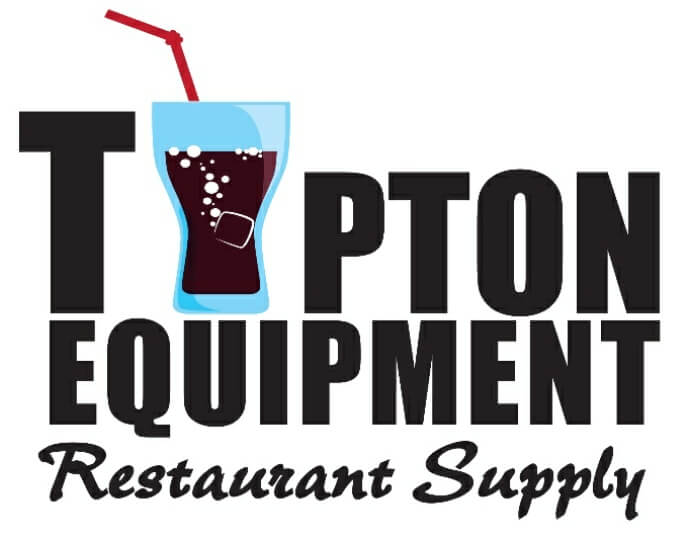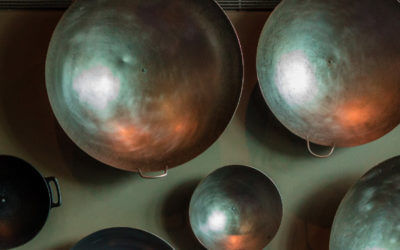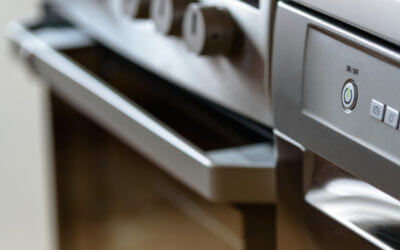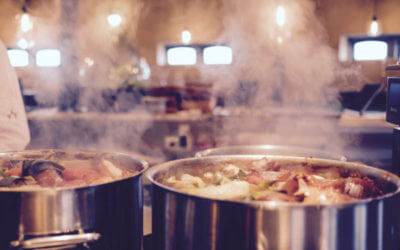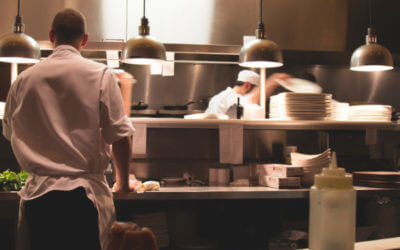How to Deep Fry Safely & Efficiently
April 12, 2019When it comes to kitchen equipment, knowing how to use it correctly is vital.
Not only does it keep your employees safe, it ensures that the food comes out well and that your equipment last a long time in good condition.
Using a deep fryer may seem pretty simple, and if everything is set up correctly it is. However, there are still tips and tricks to know, along with important safety rules. Here’s what you need to know.
The Right Temperature
Having your fryer set to the correct temperature is the first step to simple and effective cooking. The idea temperature for most foods is 350° F. Keep in mind the temperature can fluctuate, so be sure to check it several times a day.
The thermostat will tell you the temperature, but be sure to use a metal dial-style thermometer as well to make sure your thermostat is accurate.
To avoid wasting oil, you can reduce the temperature to 200° during slower times, but don’t forget to turn it back up when needed.
The Right Fryer
If you’re going to use a fryer in your daily operations, you’ll want to make sure that this vital kitchen equipment is the right model for your needs. Know whether you need a tube fryer, and open pot, or a flat-bottom fryer.
From there, you’ll need to choose the size and power source. An electric burner fryer can be great for small spaces. Finally, think about whether you need new kitchen equipment or whether a high-quality used model will work well.
When you have the right high-quality model that’s the right size, you can optimize both your speed and the money you spend on oil and upkeep.
The Right Cooking Process
When everything is set up and maintained correctly, your employees can follow a simple process for cooking. All foods should be fried from frozen, preferably straight from the freezer. Any thawing or refreezing will affect the quality of the product.
For the best results from your kitchen equipment, only fill the fry basket halfway and skim the oil regularly to remove debris. Be sure the oil reheats between batches as well.
The Right Maintenance
Of course, even with everything is cooking like you expect, there’s still cleaning and maintenance to be done. Fryer oil should be filtered every day to extend the life of your equipment (and to provide high-quality food to your customers.)
To clean the fryer, drain the kettle and rinse it with hot water to remove any food debris. Inspect valves to make sure there isn’t any oxidation of the copper, and clean the unit with a commercial cleaner designed for fryers. Drain the cleaner and rinse with water and vinegar. Drain again and wipe dry before refilling with oil.
The Right Kitchen Equipment Supplier
Of course, the first step to having high-quality fried food is to get your kitchen equipment from the right supplier. At Tipton Equipment, we’ve been serving Little Rock restaurants for many years. You can trust us to help you find high-quality new and used equipment of any type.
Need a quote? We’d love to help. Contact us today!
Don’t Buy a Commercial Refrigerator Before Considering These 4 Things
A commercial refrigerator is an equipment staple of every restaurant. There are several things to consider when acquiring a commercial refrigerator for your kitchen. When searching for the correct type of unit, here are four things to consider to help you choose the...
5 Ways to Get the Most out of Your Dishwasher
Dishwashers are an incredibly helpful timesaver, and in the fast-paced restaurant industry, staff and managers are desperate for even a small amount of extra time. Although simply putting dishes into a machine seems simple, if your dishwasher is not well-maintained...
How to Keep Having Fun while Running your Restaurant
Restaurant owners typically have a passion for cuisine. Opening and running a restaurant is exciting, providing the opportunity to fully explore and develop your vision. However, if you have been in the restaurant business for any length of time, you know that it is...
3 Great Reasons to Maintain Your Restaurant Equipment
As the owner of a restaurant, you want a healthy and clean business. In the hustle of everyday restaurant management, it can be easy to forget to take care of issues that don’t seem as pressing as the customer complaining that they got the wrong order or that their...
Avoid Surprises During an Appraisal of Your Restaurant Equipment
When it comes to time for your restaurant equipment to be appraised, confusion can set in. For the purpose of the appraisal, personal goods are given value, but goods that are classified as ‘real goods’ are considered part of the real estate or the building structure...
Essentials of Cleaning and Preventative Maintenance for Your Restaurant Equipment
When it comes to your restaurant equipment, regular cleaning and maintenance is essential for making sure your equipment lasts for years to come. And it isn’t simply a matter of making your food processors and commercial mixers more efficient. There are considerable...
3 Tips for Maintaining Your Commercial Oven
As a restaurant owner, buying a commercial oven is an enormous investment. You will desperately want this oven to work properly and you need to make sure it does. You are responsible for your restaurant business. But what if your commercial oven stops working on the...
5 Steps to Cutting Food Waste from Your Kitchen
Food waste is a problem around the world. Taking steps to prevent food waste in your kitchen doesn’t just make your restaurant more morally strong; it can also help you save money on ingredients and attract more customers. Here are some steps you can take to reduce...
Planning Your Equipment Needs When Your Restaurant is Expanding
Your restaurant is doing great, guests are coming in, and they’re spreading the word about the culinary masterpieces your restaurant offers, as well as the exceptional service that is provided by the kitchen equipment and staff. But with all the new business, you’ve...
How to Keep Cool in the Restaurant Kitchen
Being in the kitchen, it’s hard not to feel overheated, especially during the summer. The heat of the stoves and ovens will quickly make the restaurant kitchen somewhere you don’t want to be. How do you keep cool in the kitchen? We have brought together some of the...
How and Why to Make Your Restaurant Lead-Free
If you own a restaurant, then you already know how important water is to your operations, and that poor water quality can adversely impact the success of your business. That is why you should ensure a restaurant lead-free environment. Water is an integral part of all...
Can You Handle These 5 Types of Difficult Restaurant Customers?
No matter how much you love it, running a restaurant certainly has its challenges. It is time-consuming, hectic, labor-intensive and competitive. And to cap it all, there are the difficult restaurant customers you often have to deal with. It’s impossible to please...
5 Unique Restaurant Concepts Guaranteed to Thrill Diners
With restaurants on almost every block, having a unique restaurant concept can help set you apart, making your establishment stand out. These concepts may have taken a bit to catch on, but they have quickly become popular sellers. Here are 5 unique restaurant concepts...
How to Run an Energy-Efficient Restaurant
You probably don’t need to be reminded of the high cost of electricity in running a restaurant compared to an energy-efficient restaurant. Right now, many establishments, including restaurants, are going green and adopting eco-friendly strategies to conserve...
Tipping: A Restaurant Controversy
When it comes to tipping or no-tipping policies in restaurants, there are strong feelings on both sides. While many restaurants have implemented no tipping policies, others are strong proponents for tipping. Still others aren’t sure which policy is right for their...
